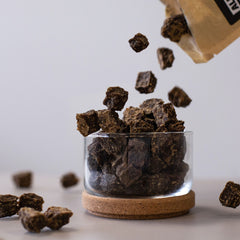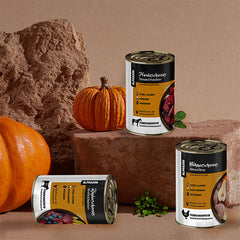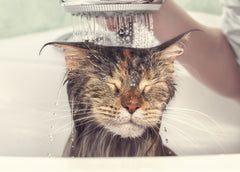Watermelon for cats: Refreshing snack or better to avoid?
Watermelon is one of the most popular fruits in summer – and for good reason! It's refreshing, delicious, and packed with valuable nutrients. But can cats eat watermelon? The answer is yes, but only under certain conditions. In this blog, you'll learn everything you need to know about watermelon for cats – from its health benefits and potential risks to proper feeding.
Can cats eat watermelon? The short answer
Yes, cats can eat watermelon if it's prepared properly. The watermelon flesh is safe for cats and can be a welcome change. The seeds and rind, however, are taboo, as they are difficult to digest and pose health risks.
What is allowed?
- Fresh, seedless watermelon flesh.
What is forbidden?
- Watermelon peel and seeds.
The benefits of watermelon for cats
Watermelon is not only refreshing but also rich in nutrients that can benefit your cat. Here are its key benefits:
1. High water content
- Watermelon is about 90% water and is ideal for supporting your cat's hydration on hot days.
2. Low in calories
- The fruit is low in calories and is therefore also suitable for cats who need to watch their weight.
3. Vitamin C
- Strengthens the immune system and promotes skin and coat health.
4. Vitamin A
- Supports vision and contributes to overall health.
5. Antioxidants
- The antioxidants contained in watermelon help fight free radicals and promote cellular health.
How much watermelon can cats eat?
The right amount is crucial to reap the benefits of watermelon without harming your cat.
Recommended amount:
- Small cats: 1–2 small pieces (approx. 1 cm³) per week.
- Medium-sized cats: 3–4 small pieces per week.
- Large cats: Up to 1/8 of a small watermelon per week.
Risks and precautions for watermelon
Although watermelon can be healthy, there are some risks you should be aware of:
1. Cores
- Watermelon seeds are difficult to digest and can cause digestive problems or even intestinal blockages in cats.
2nd bowl
- The shell is hard and difficult to digest. It can irritate the gastrointestinal tract and should therefore be removed.
3. Fructose
- Watermelon contains natural sugars, which can be harmful in large amounts, especially for cats with diabetes.
4. Overfeeding
- Too much watermelon can lead to digestive problems such as diarrhea or bloating.
5. Allergies
- Some cats may be allergic to watermelon. Watch for symptoms such as itching, vomiting, or diarrhea.
How do you properly feed your cat watermelon?
To ensure your cat can enjoy watermelon safely, you should prepare it properly. Here are some tips:
1. Remove the shell
- Remove the hard shell completely as it is indigestible.
2. Remove seeds
- Carefully remove all seeds to avoid digestive problems.
3. Cut into small pieces
- Cut the pulp into bite-sized pieces that your cat can easily eat.
4. Only fresh watermelon
- Make sure the watermelon is fresh. Avoid overripe or rotten fruit.
5. Offer in small quantities
- Start with a small piece to ensure your cat tolerates the watermelon well.
Creative ways to prepare watermelon for cats
Watermelon doesn't have to be boring. Here are some creative ways to offer it to your cat:
1. Frozen watermelon pieces
- Cut small pieces and freeze them – ideal for hot days.
2. Watermelon puree
- Puree the fruit and serve it as a refreshing snack.
3. Homemade cat treats
- Combine watermelon puree with unsweetened natural yogurt and freeze it in small molds.
4. Watermelon smoothie
- Mix watermelon puree with some water and serve it as a special treat.
When should you not give your cat watermelon?
In some cases, watermelon is not suitable for cats:
1. Diabetes
- Because of the natural fructose, cats with diabetes should only eat very small amounts of watermelon.
2. Allergies
- If your cat has had an allergic reaction to other fruits, introduce watermelon with caution.
3. Sensitive stomach
- Cats with sensitive digestive systems may react to watermelon with diarrhea or flatulence.
Frequently asked questions about watermelon for cats
“Can kittens eat watermelon?”
Yes, but only in very small quantities and well chopped.
“Is watermelon poisonous to cats?”
No, the flesh of the watermelon is not poisonous. However, the rind and seeds should be avoided.
“Can cats eat frozen watermelon?”
Yes, frozen watermelon pieces are a great refreshment for hot days.
“Which fruits are still safe for cats?”
Apples (without seeds), blueberries and bananas are also safe fruits.
Conclusion: Watermelon for cats – healthy, but with caution
Watermelon can be a refreshing and healthy addition to your cat's diet when fed in small amounts and prepared properly. Key points at a glance:
- Safe: Only the seedless flesh without the peel.
- Advantages: High water content, low in calories and rich in vitamins.
- Caution: No peel, seeds or large quantities.
With these tips, you can safely offer your cat watermelon. Not only is it healthy, but it's also a summery change that your cat will love!
















